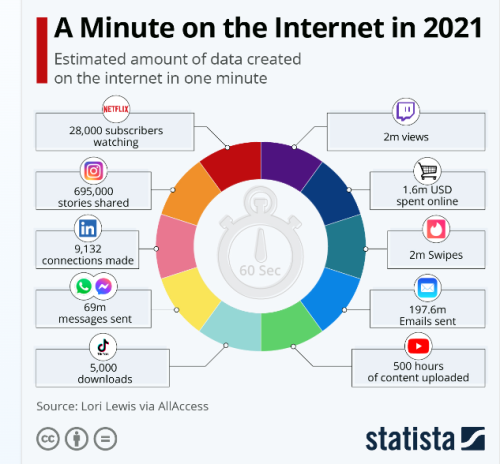1.2 Information Overload
It is common to become overwhelmed by the amount of information available on any topic. Information multiplying in the way described in the Mars example, combined with the digital tools and resources available to humanity, has resulted in people having access to unimaginable amounts of information. Additionally, humans are consuming information in a variety of new ways.
Numerous sources have said that by the year 2020 there would be 40 times more data in the digital realm than there are stars in the observable universe. To put that into perspective, “there are about 1,000,000,000,000,000,000,000 stars in space…[t]his amount is about equal to the number of grains of sand on all the beaches on planet Earth” (UCSB ScienceLine, 2013). Statista, a company that collects data from across the world for various purposes, releases an infographic each year which captures one minute on the Internet (Jenik, 2021). The graphic below shows how each item shared, viewed, downloaded, or uploaded is adding to the online information landscape. This is the stuff that begins to show up in searches, on newsfeeds, and in daily conversations.

This oversupply of information has resulted in many people experiencing information overload. This occurs when a person is exposed to more information than they can cope with and results in them having difficulties “processing and handling it” (Liu et al., 2021, p. 2). Information overload can lead to stress, an inability to analyze effectively, and a feeling of detachment. So, although the present is an exciting time in which unlimited information is available with the simple click of a button, problems are emerging.
Humanity is having a difficult time keeping up. Viewing the most recent trend, being in the ‘know’, and continually receiving updates has begun to consume people’s attention. The constant flood of information engulfs even the most careful observers. The result is that often people only have time and the capability to scan information briefly (Menczer & Hills, 2020). When it comes to information — if people are skimming, viewing portions, and missing pieces completely, how accurate and reliable is the lens through which they see the world?
When a person is exposed to more information than they can digest, resulting in feelings of stress and disorientation.

